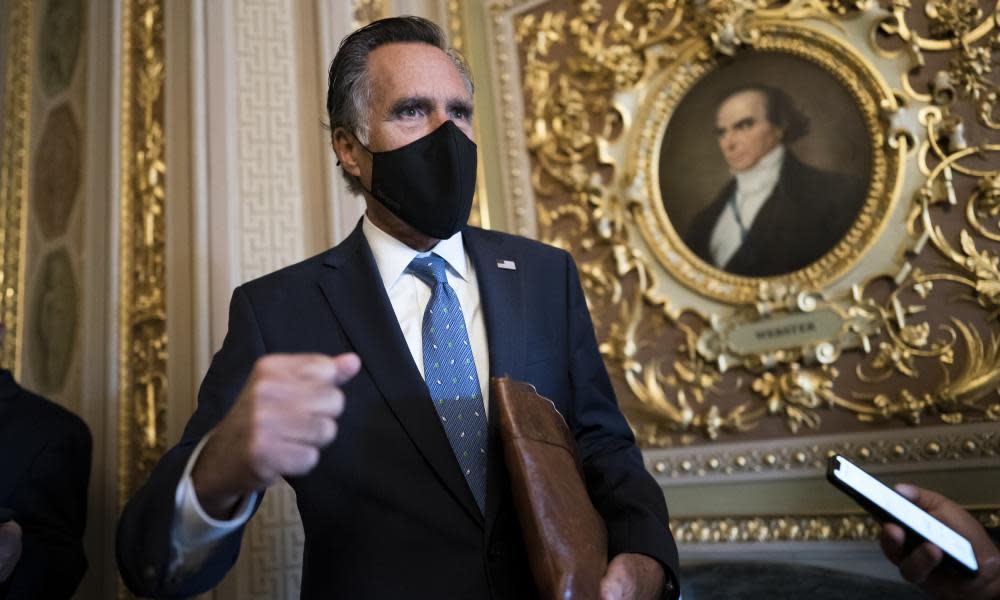Republicans unveil two minimum wage bills in response to Democrats' push

Republican lawmakers have been vocal about their opposition to Joe Biden’s coronavirus relief bill, particularly to Democrats’ inclusion of a provision that would raise the federal minimum wage from $7.25 an hour to $15 an hour.
Related: US minimum wage activists face their toughest foe: Democrat Joe Manchin
But two sets of Republicans from opposite sides of the party have now introduced bills that show what they believe are more palatable policies that address criticism of America’s current minimum wage.
The moves come amid a major push by leftwing Democrats, unions and progressive pressure groups to raise the minimum wage – a push that appears to have a higher chance of success than ever before. The campaign – often spearheaded by walkout worker protests – has put pressure on the Republican party to respond.
In keeping with the party’s deep division between its dominant Trumpist faction and its more traditionalist party elites, the twin responses seem aimed at appealing on one hand to its corporate-friendly allies and on the other hand to its populist rightwing base. Both have an anti-immigrant element.
Senators Mitt Romney and Tom Cotton unveiled on Tuesday a proposal for a $10 federal minimum wage, to be implemented over the course of four years with a slower, phased approach for small businesses. Their bill also requires employers to use the federal government’s E-Verify program to ensure they are not hiring undocumented workers.
Currently, 29 states, including Arkansas, Cotton’s home state, have minimum wages above the federal level. A few states have already passed a $15 minimum wage, including California, Massachusetts and Colorado.
In a statement about the bill, Cotton railed against “millions of illegal immigrants” who compete with American workers “for too few jobs with wages that are too low”. Meanwhile, Romney said the legislation “would raise the floor for workers without costing jobs”.
While immigration has largely been left out of the debate over a $15 minimum wage, Republicans when arguing against the wage hike have cited a report from the Congressional Budget Office that 1.4m jobs could be lost with the increase.
The same report also says that 17 million workers would see increases in their wages and 900,000 Americans could be lifted out of poverty with the policy. Romney and Cotton’s plan would affect the wages of 3.5 million workers, according to a fact sheet by Romney’s office.
Subtly referring to the bill on Twitter, the Democratic representative Alexandria Ocasio-Cortez called a $10 minimum wage “legislated poverty” on Tuesday.
Meanwhile, the far-right Republican senator Josh Hawley of Missouri released his alternative to an increase in the minimum wage: a tax credit for those who make less than $16.50 an hour. The credit would be applied based on the number of hours a person worked and would be available only to those with an American social security number, barring non-US citizens and undocumented workers. A full-time worker could get up to $4,680 in tax credits a year, according to the bill.
Related: Sanders confident of raising minimum wage as part of $1.9tn Covid package
“It’s time we give blue-collar workers some respect and a pay raise. This plan would deliver meaningful relief for families and working Americans through higher pay while incentivizing and promoting work,” Hawley said in a statement.
According to Axios, Hawley’s team estimated his plan would cost the government $200bn, a figure traditional Republicans would eschew. Hawley has also split off from traditional Republicans by saying on Twitter he would support a $15 minimum wage for workers of big corporations that make at least $1bn in annual revenue.
The two bills have little chance of getting any serious consideration as Democrats are focused on internal debates over their $15 minimum wage proposal. Two of the more conservative members of the party, Joe Manchin of West Virginia and Kyrsten Sinema of Arizona, indicated that they will not support the bill if it includes the wage hike.
Manchin said that he would support an $11 minimum wage, telling reporters that “throwing $15 out there right now just makes it very difficult in rural America”.

